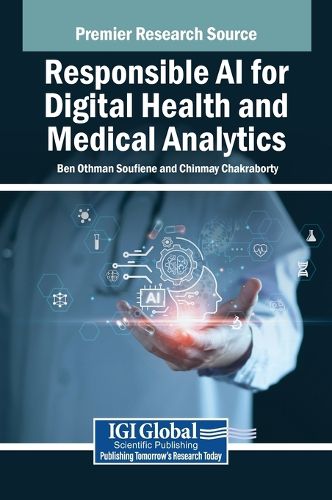Readings Newsletter
Become a Readings Member to make your shopping experience even easier.
Sign in or sign up for free!
You’re not far away from qualifying for FREE standard shipping within Australia
You’ve qualified for FREE standard shipping within Australia
The cart is loading…






This title is printed to order. This book may have been self-published. If so, we cannot guarantee the quality of the content. In the main most books will have gone through the editing process however some may not. We therefore suggest that you be aware of this before ordering this book. If in doubt check either the author or publisher’s details as we are unable to accept any returns unless they are faulty. Please contact us if you have any questions.
In recent years, the healthcare industry has witnessed a rapid integration of artificial intelligence (AI) into various aspects of patient care, diagnosis, treatment, and management. The promise of improved efficiency, accuracy, and personalized healthcare has spurred the development and adoption of AI technologies. However, this rapid advancement has brought forth numerous ethical challenges, privacy concerns, and the need for responsible governance. The increasing reliance on AI in medical analytics raises questions about patient data privacy, algorithmic bias, transparency, and the overall impact on the doctor-patient relationship. The urgency to balance innovation with ethical considerations is underscored by high-profile incidents of AI system failures, biased algorithms, and potential risks to patient safety. As technology advances, further research is necessary to showcase the possibilities of AI while navigating the complexities of responsible implementation. Responsible AI for Digital Health and Medical Analytics explores the transformative potential of AI while placing a crucial emphasis on responsible and ethical practices. It decodes complex medical analytics and examines patient privacy solutions to overcome ethical challenges. This book covers topics such as blockchain, medical diagnosis and prediction, and personalized medicine, and is a useful resource for healthcare professionals, policymakers, data scientists, computer engineers, academicians, and researchers.
$9.00 standard shipping within Australia
FREE standard shipping within Australia for orders over $100.00
Express & International shipping calculated at checkout
This title is printed to order. This book may have been self-published. If so, we cannot guarantee the quality of the content. In the main most books will have gone through the editing process however some may not. We therefore suggest that you be aware of this before ordering this book. If in doubt check either the author or publisher’s details as we are unable to accept any returns unless they are faulty. Please contact us if you have any questions.
In recent years, the healthcare industry has witnessed a rapid integration of artificial intelligence (AI) into various aspects of patient care, diagnosis, treatment, and management. The promise of improved efficiency, accuracy, and personalized healthcare has spurred the development and adoption of AI technologies. However, this rapid advancement has brought forth numerous ethical challenges, privacy concerns, and the need for responsible governance. The increasing reliance on AI in medical analytics raises questions about patient data privacy, algorithmic bias, transparency, and the overall impact on the doctor-patient relationship. The urgency to balance innovation with ethical considerations is underscored by high-profile incidents of AI system failures, biased algorithms, and potential risks to patient safety. As technology advances, further research is necessary to showcase the possibilities of AI while navigating the complexities of responsible implementation. Responsible AI for Digital Health and Medical Analytics explores the transformative potential of AI while placing a crucial emphasis on responsible and ethical practices. It decodes complex medical analytics and examines patient privacy solutions to overcome ethical challenges. This book covers topics such as blockchain, medical diagnosis and prediction, and personalized medicine, and is a useful resource for healthcare professionals, policymakers, data scientists, computer engineers, academicians, and researchers.